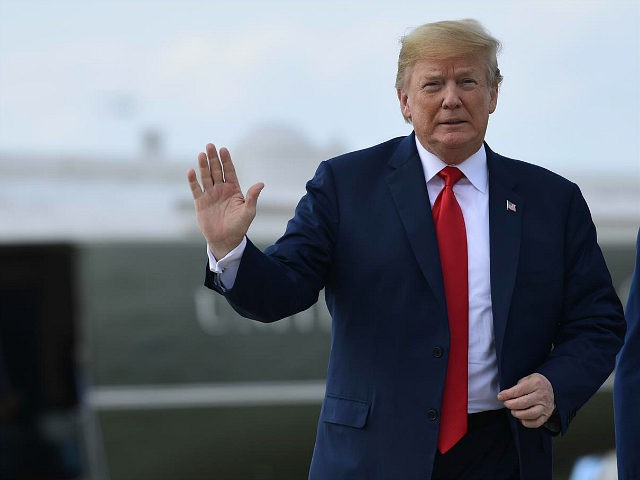President Donald Trump yielded a 45 percent approval rating in the latest joint Wall Street Journal/NBC News poll carried out between July 15th and 18th. His approval is up one percentage point from June and is at its highest point relative to previous polls of presidential approval jointly conducted by the Wall Street Journal and NBC News.
Trump enjoys support for 88 percent of surveyed Republicans. The Wall Street Journal writes:
Of the four previous White House occupants, only George W. Bush, in the aftermath of the Sept. 11, 2001, terrorist attacks, had a higher approval rating within his own party at the same point in his presidency.
The Wall Street Journal‘s analysis of its own poll credits Trump — not Democrats or their news media allies — for sparking “controversy” related to the president’s approach towards Russia and Russian President Vladimir Putin: “President Donald Trump’s approval rating edged higher during a week in which he faced withering criticism following a summit with Russian President Vladimir Putin, signaling that he is positioned to weather the latest controversy sparked by his unusual brand of politics.”
The poll asked its participants if they “believe Russia interfered in the 2016 election,” further asking if Trump’s election was dependent on “Russian interference.”
Those who accept the aforementioned assertion of “Russian interference” were further asked: “And do you believe that Donald Trump would have lost and Hillary Clinton would have won the election if Russia had not interfered with the 2016 presidential election?”
One of the poll’s questions is phrased thusly: “In general, do you believe that Donald Trump has a relationship with Vladimir Putin that is too friendly and therefore not appropriate for an American president to have with the president of Russia or do you not have an opinion on this?”
Democrats had a sampling size advantage among the poll’s respondents. Among those polled, 40 percent identified as Democrats or leaning Democrat, 15 percent identified as independents, and 36 percent identified as Republicans or leaning Republican.
The poll’s ideological breakdown was as follows: 25 percent identified as “liberal” or “somewhat liberal,” 36 percent identified as “moderate,” and 36 percent identified as “conservative” or “somewhat conservative.”
Despite surveying people about their views of “Russian interference,” the poll’s composers did not list Russia or Vladimir Putin as possible issue priorities shaping poll respondents’ voting decisions in the forthcoming congressional elections.
Follow Robert Kraychik on Twitter.

COMMENTS
Please let us know if you're having issues with commenting.